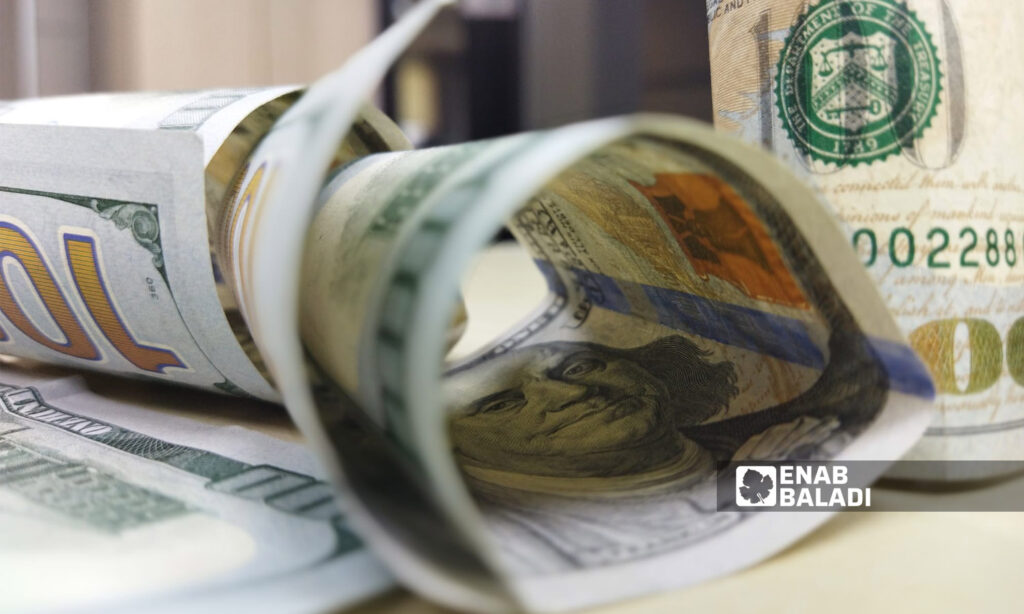In front of one of the farms in the northern countryside of Homs, cars gather, and people sit in a large guest house, each of them beside him cardboard boxes or black bags containing sums of money from the Syrian pound.
One by one, owners of bags of Syrian pounds enter Abu Jawad’s office to buy US dollars.
After converting boxes of pounds into stacks of dollars, smiling men emerge from the guest house, which has been turned into a currency exchange office.
The details of the currency conversion that takes place inside the guest house are not important to those waiting. The risks of legally owning foreign currency in Syria prompt people to turn a blind eye to the exchange rate difference between one day and the next and not to ask about the original trading price.
The exchange rate of the Syrian pound is witnessing a sharp fluctuation, prompting merchants and farmers to deal in US dollars instead of the pound, despite the legal responsibility they will bear following a decision issued by the government of the regime in 2021 criminalizing dealing in other than the pound.
Obtaining dollars in Syria has become a difficult process in light of the accelerating collapse of the exchange rate of the pound against the dollar, as most of the money changers stopped exchanging for their own accounts, and their work turned to brokering between those wishing to convert the currency, and merchants selling dollars for a profit margin.
On the date this report was published, the trading rate of $1 was 12,470 SYP, according to the S-P Today website, which covers the trading rate of the Syrian pound to the dollar.
Trading rates vary
The exchange rate fluctuates on a daily basis, up and down, and the platforms dedicated to determining prices are showing different prices from day to day, sometimes every hour. While some exchange offices stopped working in Homs, some money changers set a special price, each one separately.
According to information obtained by Enab Baladi, as a client, from the currency trader “Abu Jawad,” who is one of the largest money changers in Homs, the unstable exchange rate prompted currency traders to impose a special price that guarantees them a good margin of profit, although it is not compatible with the black market rate or the government rate.
The price difference between one exchanger and another, and the prices of pricing platforms, can reach 400 Syrian pounds for every one dollar.
On the other hand, merchants prefer dealing with a specific money changer rather than moving between several offices, which prompts them to continue exchanging currency even with the instability of the exchange rate.
Regarding the currency exchange mechanism, “Abu Jawad” said that the exchange rate is fixed with his customers via the WhatsApp application, given the exchange rate at the moment of the written conversation, then the currency is exchanged at a later time based on the price agreed upon in the conversation itself.
The trader added that work in exchange today is mostly limited to mediators, or brokers as they are called locally, as money changers secure customers and then connect them with currency dealers in exchange for profits they receive after completing deals.
Abu Jawad indicated that working in this sector has its legal risks, but he is responsible for securing foreign currency for a large group of customers, and he cannot stop providing this service.
Marwan, a farmer, constantly exchanges his money for dollars in order to avoid a heavy loss that might befall him with the sudden change in the exchange rate, as the prices of agricultural products are closely linked to exchange rates.
Marwan told Enab Baladi that he had recently received the price of his wheat crop and went directly to buy dollars to preserve what he earned during the agricultural season.
He added that the exchange rates were shocking because online exchange rates platforms show a higher value than those offered by the market, but in the end, he is forced to avoid keeping the Syrian pound, which makes exchanging it an inevitable option.
Skyrocketing trading rates
The value of the Syrian pound hit a new record low, despite the regime’s commitment to measures to control the exchange rate of the pound.
The selling price of the US dollar exceeded 13,200 Syrian pounds, and its purchase price was 13,000 pounds, while the euro’s sale reached 14,610 pounds, and its purchase price reached 14,384 pounds in the middle of last week.
On July 11, $1 broke for the first time in the history of the Syrian pound, the barrier of 10,000, SYP, to begin the process of accelerated deterioration.
Despite the significant decline in the value of the pound, the Central Bank of Syria has not, since July 18, adjusted the foreign currency rates against the pound in its “Remittances and Exchange” bulletin, and kept it at 9,900 pounds per dollar while the price of the euro was set at 10,938 pounds per euro.
The depreciation of the pound is directly reflected on the residents of the areas controlled by the regime, as it is accompanied by a rise in the prices of food and basic foodstuffs, which exacerbates their weak purchasing power, which the government meets with promises to control the exchange rate that are not reflected in reality.
Enab Baladi’s correspondent in Homs, Orwah al-Mundhir, contributed to this report.

